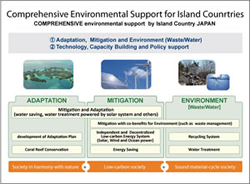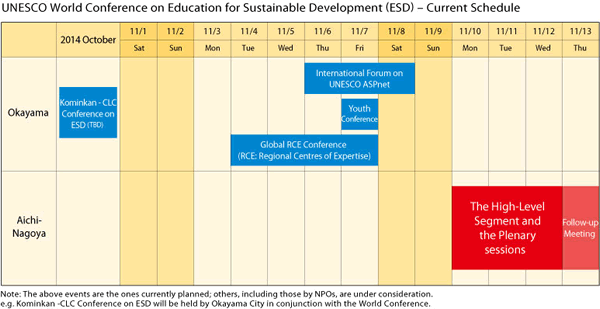Current topics
International Conference on Climate Change and Coral Reef Conservation
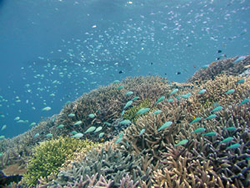
Rich coral reef in Yonara Channel
On 29-30 June 2013, the "International Conference on Climate Change and Coral Reef Conservation" (hosted by Ministry of the Environment and Okinawa Prefecture) was held at the Okinawa Institute of Science and Technology Graduate University (OIST). Relevant knowledge was shared and opinions were exchanged at the Conference with the participation of government officials and experts from 14 countries and regions, including Minister of the Environment of Japan, Mr. Ishihara, and Minister of the Environment and Energy of Maldives, and Minister of the Finance of Palau, and the IPCC Chairman, Dr. Pachauri, and experts in a broad range of fields such as global warming countermeasures and coral reef conservation in island countries. At the Conference, the plenary session, four section meetings and side events were held during the two days. Minister Ishihara started the session by announcing the "Comprehensive Environmental Support for Island Countries", followed by broad discussions on ecotourism and adaptation measures to climate change, and finally the confirmation that Japan and other island countries will continue the Okinawa-based cooperation and discussion.
What is Comprehensive Environmental Support for Island Countries?
This is Japan's comprehensive environmental support for adaptation to climate change, global warming mitigation measures, and other environmental measures such as waste management and water treatment. It utilizes the acquired experience and technologies of Japan as an island country. In particular, this aims to achieve a low-carbon and sound material-cycle society that is in harmony with nature through the introduction of renewable energies such as solar and wind power alongside coral reef conservation, making use of the experiences in Okinawa.
Four themes discussed in the Conference
- Coral reef conservation
- Mitigation measures on climate change in islands
- Current Status and Prospects of Ecotourism in Coral Reef Islands
- Adaptation to climate change
MORE Information
Amending the Law for the Conservation of Endangered Species of Wild Fauna & Flora (LCES) and the Invasive Alien Species Act (IAS Act)
- Towards further promotion of wildlife protection and management in Japan -
Outline of the LCES
In order to conserve endangered species of wild fauna and flora, the Act is intended to take measures such as the prohibition of capture and transfer of such species.
Main reasons for amendment
Individuals of endangered species of wild fauna and flora are traded at high prices due to their scarcity; mild penalties under the existing law have allowed malicious, illegal trades.
Examples of prices of illegally traded items

Ivory (entire shape)
17 mil. yen for 47 pieces
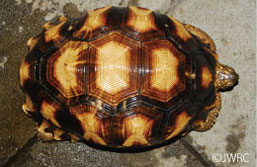
Astrochelys yniphora
7 mil. yen for 2 tortoises
Main details of the amendment
Significantly strengthened the penalty for illegal transfers.
Individual: imprisonment of up to one year or a fine of not more than one million yen

[Amendment] Imprisonment of up to five years or a fine of not more than five million yen
Juridical person: a fine of not more than one million yen

[Amendment] A fine of not more than 100 million yen
Outline of the IAS Act
In order to prevent damage to Japan's ecosystems caused by IAS, the Act is intended to take measures including mitigation as well as to regulate handling, including raising and import of IAS.
Main reasons for amendment
Hybrids of IAS are unregulated.
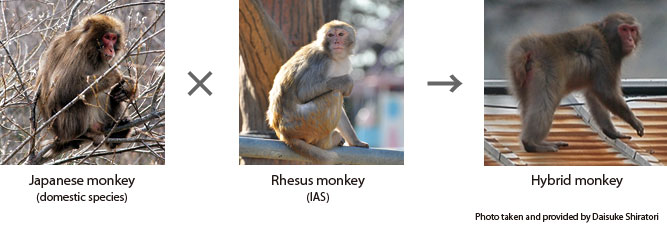
- Release of IAS is prohibited, which has precluded any studies involving release that are designed to develop methods of mitigation (e.g. by tracking the individuals of IAS).
- There is no provision to require importers to take necessary actions such as disinfection even in cases where IAS are attached to or mixed in imported goods.
Main details of the amendment
- Hybrids of IAS also became subject to control.
- Instituted a permission scheme for the release of IAS for academic research that is conducive to promoting their mitigation.
- Set the standards for the disinfection method for IAS that are attached to or mixed in imported goods; the competent ministers may order importers to take measures such as disinfection.
UNESCO World Conference on Education for Sustainable Development 2014
The End-of-DESD Conference (DESD: Decade of Education for Sustainable Development) will be held in Japan.
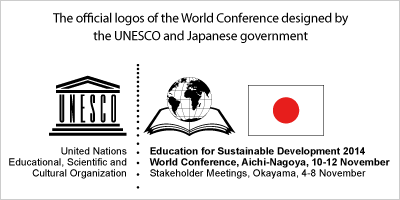
Education for Sustainable Development (ESD) means education for purposes that encourage each individual to recognize that everyone has a relationship with people around the world, future generations, and the environment, and to change behaviors towards realization of sustainable society.
In 2005, the United Nations Decade of Education for Sustainable Development was launched. In November 2014, the final year of that UN Decade, the "UNESCO World Conference on Education for Sustainable Development (ESD)" will be co-hosted by UNESCO and the Government of Japan in Nagoya City, Aichi Prefecture and Okayama City, Okayama Prefecture.
This Conference will celebrate the Decade's achievements and discuss the Agenda for ESD beyond 2014. The High-Level Segment and the Plenary sessions will take place in Nagoya, while several stakeholder meetings such as the Global RCE Conference (RCE: Regional Centres of Expertise), the International Forum on UNESCO ASPnet (Associated School Project Network), and the Youth Conference in Okayama.
To ensure a successful World Conference, the Ministry of the Environment has made efforts to achieve a sustainable society through boosting ESD efforts both inside and outside Japan, by increasing ESD efforts and improving their quality in cooperation with related Ministries including the Ministry of Education, Culture, Sports, Science and Technology.
MORE Information


